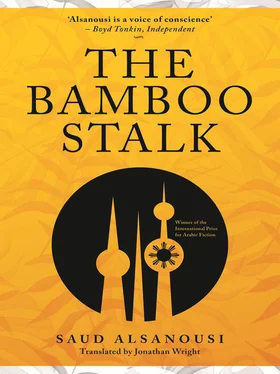5
Kuwait was beautiful. That’s what I thought when Ghassan took me out to the shopping malls and the restaurants. The streets were remarkably clean. They had to be, because the cars that drove on them weren’t ordinary cars. Each building and house was different, and each had some special feature — the colours, the design and so on. And the cars parked outside were so beautiful!
I was particularly struck by the way men kissed each other as a form of greeting. In fact it wasn’t really a kiss, but it came close to one. The man brushed his cheek against the other man’s cheek as they shook hands. I heard from Ghassan that it was the traditional form of greeting here, and not just between men. In fact the women did the same when they greeted each other.
One man walked past us and whispered ‘ As-salam aleekum ’ and kept walking as Ghassan replied, ‘ Wa aleekum as-salam .’ I turned to Ghassan and asked if he knew the man. He shook his head. Before I had time to ask more questions, he was saying ‘ As-salam aleekum ’ to one of the men at the door to the lift in the shopping mall. ‘Do you know him ?’ I asked him again. He shook his head. So why did they greet each other , I wondered.
People looked and dressed so differently from each other, sometimes the complete opposite. I pointed to one man whose appearance caught my attention and asked Ghassan where he was from. ‘He’s Kuwaiti,’ he said.
‘And that one?’
‘Kuwaiti.’
‘No, no, I don’t mean that one, I mean that one.’
‘They’re both Kuwaiti.’
‘And the one standing there?’
‘Kuwaiti.’
‘And the girl who’s wearing the. .’
‘Kuwaiti too.’
And so on, and so on.
Some people wore clothes that followed the latest fashions. Others wore traditional clothes. There were people in shorts, in T-shirts or in jeans. There were young men with long hair visible under their headdresses. There were people in clothes that would be tight even on thin people. There were young people who had bizarre hairstyles that I really liked, while others wore hats. Some had white headdresses and others wore red ones. There were burly athletic bodies and others that were very thin. There were lots of girls, with different hairstyles, nice clothes, some short skirts and some long, and bright colours. Some of them covered their hair with headscarves of various kinds — beehive-style scarves, scarves that showed a wisp of hair on the forehead, scarves that covered all the hair and others that also covered part of the chin. Black thobes, some of them so tight that they showed details of the woman’s body, others loose. There were young women who looked like Hollywood stars, others with so much powder on their faces that they looked like geishas. Sharp noses, unnaturally full lips. There were women who covered their faces with pieces of black cloth that only showed the eyes. Black hair, blonde hair. Brown people, white people, black people.
With so many differences, I found reason to hope. You’ll be invisible among all these people , I told myself.
* * *
I stayed as Ghassan’s guest for more than a month. During that time Kuwait gradually cheered up. At the end of January the new Emir took office and his picture started to spread in the newspapers, on the streets and on cars. By the last week of February Kuwait was completely changed. I wouldn’t be exaggerating if I said I saw Kuwait dancing for joy on 25 February.
Ghassan took me out for a ride in what he called his ‘beloved’, his white Mitsubishi Lancer, to the streets near the sea. The air was cold although it was sunny. It grew more crowded as we drove closer to the area on the coast. Cars were flying flags of all sizes and playing loud patriotic songs with the windows down. The car horns competed with each other. There was clapping and cheering and people looked happy. On national holidays Kuwaitis fire water pistols and foam sprays at each other, so it’s like a giant washing machine. That’s what I felt. People were singing and dancing soaked in water and covered in foam, as if they were washing in a communal bath. Ghassan made sure all the car doors were locked, saying that some people wouldn’t hesitate to open car doors and spray the passengers with water and foam.
I remembered the crazy young men I used to see at Boracay and realised they were only a small sample of those who were dancing in the street on National Day.
I looked into people’s faces, examining them closely. There must surely be a place for me in this mixture, which blended together well despite the diversity.
My musings were interrupted by a strange noise. A woman had put her hand close to her mouth and was flapping her tongue up and down, making a noise rather like the war cries of the American-Indians.
I was struck by how people interacted. The deep sadness on the day I arrived had changed in record time into enthusiastic celebration.
‘Did you — my father, Walid and you — celebrate like this?’ I asked.
‘Not at all,’ said Ghassan, as if I had made some accusation.
‘We celebrated our love for Kuwait in here,’ he said, pointing to his heart.
6
‘Are you prepared to meet your grandmother tomorrow?’ Ghassan asked me on the evening of the day he took me to the National Day celebrations.
‘I don’t know,’ I answered hesitantly. ‘She used to hate me.’
I watched Ghassan’s face, expecting some encouragement from him, but he didn’t say anything. ‘Do you think she still feels the same way?’ I continued.
‘I’ve no idea, Isa, but. .’ Ghassan began, then paused. ‘Don’t think it will be easy,’ he continued.
The next morning, a little after eleven thirty, I was shaking and sweating. I sat next to Ghassan in his beloved car. He parked outside my grandmother’s house and looked at me. ‘Isa! What’s wrong?’ he said.
‘Take me back to Jabriya, please.’
He took a paper handkerchief out of the box in front of him and passed it to me. ‘Isa, take it easy,’ he said. ‘Don’t be. .’
I hated myself when I couldn’t stop myself looking so weak. I cried like a child who was about to be thrown down a dark hole. Ghassan was shaken. He started patting me on the shoulder. ‘Take it easy, take it easy,’ he said.
He opened the car door and said, ‘You stay here. I’ll go and see your grandmother alone.’ He closed the car door, then put his elbows on the window sill and put his head and shoulders through the hole. ‘I’ll talk to her about you, and then I’ll come and invite you in,’ he said. ‘Be brave,’ he added with a broad smile.
I wiped my tears away with the handkerchief and watched him ring the doorbell. He spoke to a maid who looked Indian. She went off for a while, then came back to let him in. Ghassan disappeared into the house, but the door remained open.
Which door would he come out through , I wondered. Would he come out of the garage door with his tail between his legs, like my father years earlier? I looked at the big house and imagined my mother working inside. How did she manage to look after such a big house all by herself?
‘ Allahu akbar, Allahu akbar ,’ called the muezzin from a small mosque about fifty metres from Grandmother’s house, followed by other calls to prayer from far and near: ‘ Allahu akbar, Allahu akbar .’ It was the first time I had heard the call so clearly and so close up. I had a strange feeling. Something about it reassured me. The words sounded familiar even though I didn’t know the language. Something still inside me started to stir. It was the same call that my father had whispered in my right ear just after I was born. That was the first human voice I ever heard. Did the call to prayer perhaps stir a subliminal memory of the words my father whispered? It was a sound that made me curious to go into the mosque near my grandmother’s house — a curiosity I had never felt when I went past the Golden Mosque or the Green Mosque in Quiapo in Manila.
Читать дальше












